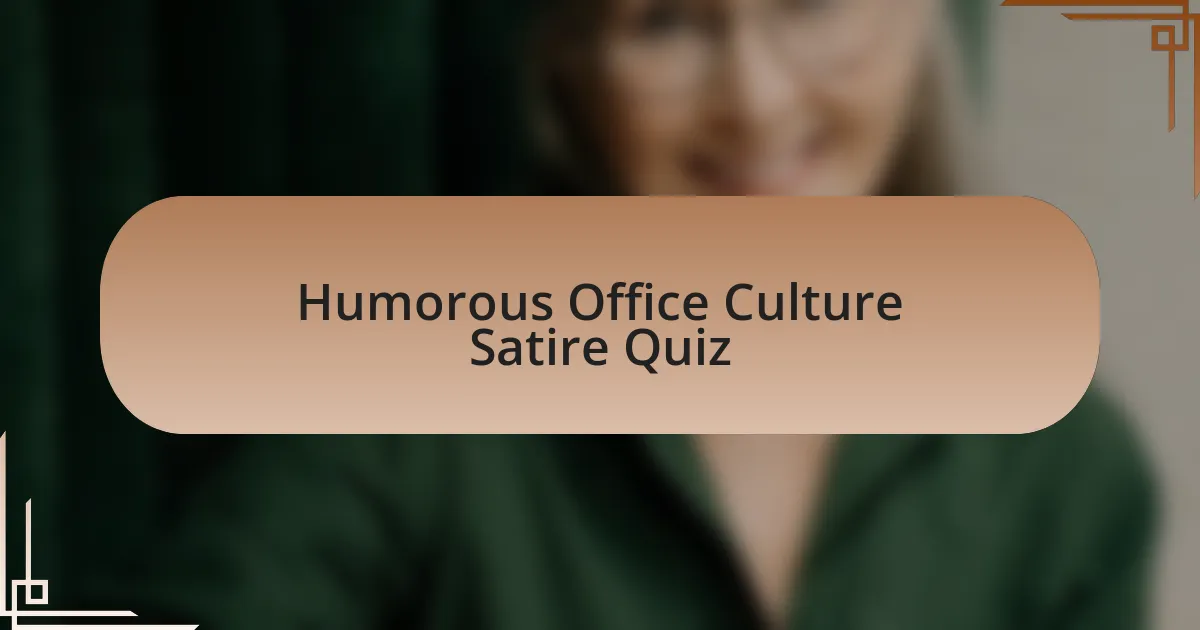Start of Humorous Office Culture Satire Quiz
1. What is satire?
- A form of storytelling that avoids any criticism or insight.
- A style of humor that focuses solely on slapstick and physical comedy.
- Humor that utilizes exaggeration, ridicule, and irony to expose someone`s flaws and shortcomings.
- A type of comedy that only tells silly jokes and anecdotes.
2. Which TV show is known for its satirical comedy?
- Game of Thrones
- The Office
- Friends
- Breaking Bad
3. What is the name of the episode from The Office that is a salient portrayal of satirical comedy?
- Dinner Party
- The Dundies
- Office Olympics
- Diversity Day
4. What does Michael Scott do in the episode `Diversity Day` to promote diversity?
- He hosts team-building activities focused on understanding different cultures.
- He organizes a multicultural potluck to celebrate different cuisines.
- He makes everyone put a notecard with a racial or ethnic group written on it on their foreheads and uses problematic stereotypes as clues.
- He invites a diversity speaker to give a presentation about inclusivity.
5. How does Michael Scott`s method of promoting diversity in `Diversity Day` impact the office?
- It makes the entire office very uncomfortable.
- It leads to a team-building exercise that everyone loves.
- It fosters a sense of unity among employees.
- It encourages everyone to express their racial pride.
6. What is the main critique of Michael Scott`s method in `Diversity Day`?
- His method is overly supportive and ineffective.
- His method is too cheerful and lighthearted.
- His method is not nuanced, sensitive, or productive.
- His method is too formal and convoluted.
7. What is the danger of satire in shows like The Office?
- Viewers might watch and impersonate Michael`s racially insensitive jokes without considering them hurtful and disgusting.
- Characters become too relatable, leading to confusion about real-life expectations.
- Audiences start to believe that all office humor is appropriate and harmless.
- It encourages more playful pranks that disrupt workplace harmony.
8. How do some people react to Michael`s racially insensitive jokes in `Diversity Day`?
- They suggest he should make even more jokes like these.
- They feel completely indifferent and ignore them.
- They might laugh at them without understanding the harm they cause.
- They praise Michael for his cleverness and insight.
9. What is the purpose of satire in comedy?
- To create simple jokes for laughs.
- To confuse the audience with irony.
- To entertain without any message.
- To criticize and convey an opinion.
10. How does The Office use satire to critique office culture?
- By portraying office employees as superheroes who solve all problems.
- By exaggerating and ridiculing common office behaviors and stereotypes.
- By making employees appear as mindless robots following orders.
- By glorifying corporate success and competition among staff.
11. What is an example of a satirical comedy show that uses parody?
- The Big Bang Theory
- Game of Thrones
- Friends
- Saturday Night Live (SNL)
12. How does SNL use satire?
- By using serious drama to convey messages.
- By organizing community service events on air.
- Through exaggeration, imitation, and parody.
- Through providing heartfelt testimonials from guests.
13. What is an example of a satirical comedy show that uses witty jokes?
- The Simpsons
- The Daily Show with Trevor Noah
- Game of Thrones
- Friends
14. How does The Daily Show with Trevor Noah use satire?
- Through musical performances and dance numbers.
- By showcasing dramatic reenactments of historical events.
- Through witty jokes with emphasized punch lines.
- By presenting serious news reports without humor.
15. What is the difference between SNL and The Daily Show in terms of satire?
- SNL uses satire through serious discussions, while The Daily Show uses satire through slapstick humor.
- SNL uses satire through drama and tension, while The Daily Show uses satire through rants.
- SNL uses satire through harsh critiques, while The Daily Show uses satire through celebrity interviews.
- SNL uses satire through exaggeration and parody, while The Daily Show uses satire through witty jokes.
16. What is the significance of `Diversity Day` in The Office?
- It promotes unity by having a group hug session.
- It celebrates cultural differences through a talent show.
- It highlights the need for nuanced and sensitive discussions about race and diversity.
- It encourages everyone to share their favorite food from their heritage.
17. How does Michael Scott`s character contribute to the satire in `Diversity Day`?
- He encourages open dialogue about race and promotes sensitivity in discussions.
- He tries to unite the office by sharing positive stories about different cultures.
- His character exemplifies the flaws and shortcomings of his approach to diversity, making it a satirical critique.
- He creates a fun and engaging atmosphere that fosters understanding among employees.
18. What is the impact of Michael`s actions on the office environment?
- It boosts employee motivation and productivity.
- It enhances collaboration and team spirit.
- It makes the entire office very uncomfortable.
- It creates a fun and engaging work atmosphere.
19. How does the episode `Diversity Day` address the issue of stereotypes?
- It promotes stereotypes as a standard for behavior.
- It uses stereotypes as a form of exaggeration to highlight their problematic nature.
- It uses humor to dismiss stereotypes as unimportant.
- It ignores stereotypes completely, focusing on positive traits.
20. What is the lesson learned from Michael`s method in `Diversity Day`?
- That everyone enjoyed the exercise and learned a lot.
- That his method is not effective in promoting diversity and can be harmful.
- That his method successfully united the team.
- That his jokes were well-received and applauded.
21. What is the role of irony in satire?
- To simply mock characters without offering any commentary on their actions.
- To convey a message in a way that is not immediately clear, often by using unexpected twists or contradictions.
- To create humor without any deeper meaning or insight.
- To entertain audiences with straightforward jokes that have no underlying critique.
22. How does satire help in social commentary?
- By focusing solely on individuals rather than societal issues.
- By using humor to critique and expose societal flaws and shortcomings.
- By making jokes that only entertain without any meaning.
- By avoiding sensitive topics to keep people laughing.
23. What is the difference between humor and satire?
- Humor can only be funny, while satire must always be sad.
- Humor is always light-hearted, while satire is always serious and somber.
- Humor addresses personal feelings, while satire addresses only political issues.
- Humor is general amusement, while satire is humor used to make a specific point or critique.
24. How does Portlandia use satire in its comedy?
- By avoiding any criticism of societal norms or behaviors.
- By replicating traditional sitcom formulas without innovation.
- By focusing solely on serious social issues without humor.
- By providing social commentary through sketch comedy, often using irony and exaggeration.
25. What is the significance of Portlandia in the context of satirical comedy?
- It primarily showcases stand-up comedians discussing their personal lives.
- It serves only as a platform for musical performances without any satire.
- It mainly focuses on puns and wordplay without deeper meaning.
- It demonstrates how satire can be used to comment on social issues in a humorous yet critical way.
26. How does The Office use stereotypes in its satire?
- By exaggerating and ridiculing common stereotypes, highlighting their problematic nature.
- By presenting stereotypes as factual without any humor.
- By promoting positive stereotypes and celebrating differences.
- By ignoring stereotypes and focusing on character backstories.
27. What is the danger of laughing at jokes that are meant to be satirical?
- Viewers could laugh and feel entertained without realizing it’s comedy.
- Viewers might miss the point of the satire and repeat the jokes without understanding their critique.
- Viewers may find the jokes funny but fail to appreciate the humor.
- Viewers might ignore the message and just enjoy the laughs.
28. How does The Office critique office culture?
- By satirizing common office behaviors, such as bureaucracy and meetings.
- By promoting corporate strategies through motivational speeches.
- By avoiding any mention of workplace issues altogether.
- By glorifying competitive workplace environments.
29. What is an example of a satirical video about office culture?
- Office Wars: The Ultimate Prank Compilation.
- The Office Dance-Off Contest 2020.
- How to Survive an Office Fire Drill.
- The video `If Only It Were That Simple` (Office Humor) on YouTube.
30. How does the video `If Only It Were That Simple` use satire?
- By depicting an efficient and well-organized office environment without humor.
- By exaggerating the ease of getting things done in an office, highlighting the absurdity of office bureaucracy.
- By promoting teamwork and collaboration among employees in a fun way.
- By showing realistic office procedures that everyone can relate to and appreciate.
Quiz Successfully Completed!
Congratulations on finishing the quiz on ‘Humorous Office Culture Satire’! We hope you enjoyed this light-hearted journey through the quirks and laughs found in the workplace. Humor serves as a wonderful tool for coping with stress and building camaraderie. You likely uncovered some hilarious truths about everyday office life.
Throughout the quiz, you may have learned how satire shines a light on the absurdities we encounter daily. From colorful characters to relatable anecdotes, these comedic takes can help highlight workplace dynamics. Understanding these humorous aspects can improve team morale and elevate colleagues’ spirits.
If you found this topic entertaining, we invite you to check out the next section on this page. It offers deeper insights into ‘Humorous Office Culture Satire,’ complete with examples, analyses, and more laughs. Delve in and expand your knowledge while continuing to enjoy the lighter side of office life!
Humorous Office Culture Satire
Understanding Humorous Office Culture
Humorous office culture refers to the integration of humor within workplace environments. It fosters an atmosphere where employees feel comfortable, leading to increased morale. Light-hearted interactions can enhance teamwork and creativity. Research indicates that a playful workplace can significantly reduce stress levels, promoting employee well-being and job satisfaction.
The Role of Satire in Office Humor
Satire in office humor critiques workplace behaviors and societal norms. It often exaggerates real-life scenarios, revealing absurdities in corporate culture. Through satire, employees can address frustrations indirectly. This method allows for honest expression without direct confrontation, facilitating a more open dialogue about issues in the workplace.
Common Themes in Office Humor Satire
Common themes in office humor satire include bureaucracy, pointless meetings, and micromanagement. These themes highlight the everyday challenges employees face. By parodying these experiences, satire captures shared frustrations, making them relatable. This relatability strengthens camaraderie among employees, promoting a fun, united work environment.
Benefits of Humorous Satirical Practices
Humorous satirical practices in the workplace yield several benefits. They encourage creative thinking and problem-solving by alleviating stress. Employees who engage in humor demonstrate increased collaboration and communication. Companies with a strong humorous culture often experience higher employee retention rates as a result of enhanced job satisfaction.
Examples of Satirical Humor in the Workplace
Examples of satirical humor in the workplace often include parody emails, exaggerated job titles, and comedic skits. These methods creatively highlight office quirks. Social media platforms, like Twitter and LinkedIn, showcase satirical memes reflecting common workplace scenarios. Such examples foster shared laughter and relieve workplace tension, reinforcing a positive culture.
What is Humorous Office Culture Satire?
Humorous office culture satire is a comedic approach that critiques and exaggerates the behaviors, norms, and practices found in workplace environments. This type of satire often highlights the absurdities of corporate culture, such as pointless meetings, office politics, and employee stereotypes. For example, shows like “The Office” effectively use humor to depict the mundane yet bizarre elements of working life, providing both entertainment and social commentary.
How does Humorous Office Culture Satire affect workplace dynamics?
Humorous office culture satire can improve workplace dynamics by fostering camaraderie among employees and reducing stress. By using humor to address serious topics, employees may feel more comfortable discussing issues within the workplace. Studies have shown that humor can enhance creativity and collaboration, leading to a more positive work environment where employees feel valued and engaged.
Where can one find examples of Humorous Office Culture Satire?
Examples of humorous office culture satire can be found in various media, including television shows, movies, webcomics, and books. Popular television series like “The Office,” “Parks and Recreation,” and “Brooklyn Nine-Nine” showcase satirical portrayals of office life. Online platforms like YouTube often feature comedic sketches that play on office stereotypes, providing easily accessible examples of this genre.
When did Humorous Office Culture Satire become popular?
Humorous office culture satire gained significant popularity in the early 2000s, particularly with the debut of “The Office” in 2005. This series, along with others like “30 Rock” and “Parks and Recreation,” tapped into the collective experiences of the modern workplace. The increase of corporate culture critiques during this period reflected a growing discontent with traditional work environments, making satire particularly resonant with audiences.
Who are notable creators of Humorous Office Culture Satire?
Notable creators of humorous office culture satire include Greg Daniels, the showrunner of the U.S. version of “The Office,” and Tina Fey, the creator of “30 Rock.” These creators have crafted shows that expertly blend humor with critiques of workplace culture, using their characters and storylines to reflect real-life employee experiences and office dynamics.


